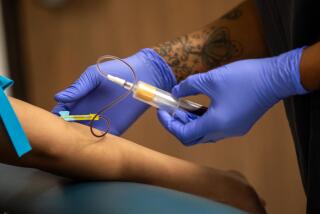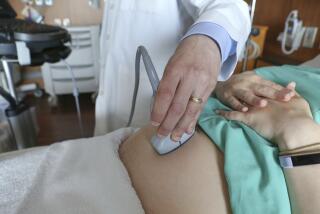Clinics Find a Ready Market for Private Testing for AIDS
- Share via
SAN DIEGO — From pharmaceuticals to home health care, the AIDS epidemic is spawning a widening variety of business opportunities.
But few of the AIDS-related businesses are more visible than the small but growing number of AIDS antibody test sites where patients concerned that they may have come into contact with the deadly virus pay fees of around $40 to have their blood tested and analyzed within 48 hours.
Reflecting the public’s increased awareness of and concern over AIDS, many of the clinics use advertising and public relations campaigns to market themselves, much like tax preparers and legal clinics. Selling points are privacy and quick turnaround of results--by contrast, analysis of tests performed by the San Diego County Department of Health Services can take three weeks.
The campaigns seem to be striking responsive chords. Two San Diego clinics that have opened over the last four months solely to perform the AIDS antibody tests report that business is booming. (At least five private AIDS antibody test sites are open in the Los Angeles area and perhaps a dozen in the San Francisco Bay Area, state health officials said.)
San Diego physician Donald L. Kramer opened the AIDS Testing and Education Center on El Cajon Boulevard at Interestate 805 on May 1 with partners Dr. Jay E. Lasner and Souheil Khoury. Kramer said that he expects to administer more than 300 tests in June, double the 116 tests his clinic ran in May, its first full month in business. Kramer and his partners need to administer at least 250 tests per month to break even, he said.
American Life Systems, an AIDS antibody test clinic open since March and situated on La Jolla Boulevard, issues ID cards to those who test negative. The clinic saw more than 200 clients in May, double the preceding month, said President Dennis Meehan. Before going into AIDS testing, Meehan ran a drip irrigation business in El Cajon.
The test, called the ELISA or enzyme-linked immuno-sorbent assay, picks up evidence of the AIDS antibody produced by the human immune system to combat the virus. About one-third of the patients who test positive for the antibody go on to contract the disease, health officials say.
AIDS test centers are classic, free market responses to an imbalance in supply and demand, said Kramer, 31. “There’s a pent-up demand. There are a number of people who want the test performed who can’t get it done in a timely fashion,” he said. In addition to their duties at the AIDS test site, Kramer and Lesner are both staff physicians in general practice at Rees-Stealy Medical Group in San Diego.
Delay at Public Clinics
Because of growing public concern over AIDS, the county Department of Health Services has seen a flood of patients seeking tests. As a result, patients must wait as long as three hours to be tested at one of the five county test sites and three weeks to get their results back. The crowds at the county health centers get even thicker when an AIDS victim who is a public figure, such as Paul Gann, is in the news, Kramer said.
Kaiser Permanente Medical Care Program, a health maintenance organization with 240,000 subscribers in San Diego County, has performed the AIDS antibody test for its subscribers for the last two years. An increase in demand for the test over the last several months has caused a one- to two-week wait for test results, a spokesman for the company said.
Many patients wanting the test who don’t mind the wait are bothered by the lack of privacy at the county clinics, Kramer said. In response, his clinic features a special side entrance that enables those being tested to avoid the reception area, Kramer said.
The county’s AIDS test overload is exacerbated by the reluctance of many physicians to administer the tests in their offices because of stringent state confidentiality laws that subject doctors to misdemeanor charges, fines and civil liability if positive AIDS antibody results are released without the patient’s written consent. Many of those doctors refer patients to the county or to clinics such as Kramer’s.
Most doctors do not list a positive AIDS test in a patient’s medical records for fear that it could be inadvertently leaked, said Dr. Ramon Moncada, a Chula Vista physician specializing in infectious diseases.
High Security
“You are taking a tremendous risk (in administering the ASIDS test) with the current law,” Moncada said. “It’s a law where the patient has to sign a consent form and be informed of the risk of the information leaking out. The patient is also told the doctor is liable of going to court and paying a fine if the information gets out. It’s time-consuming, it’s excessive and you have to handle the information with high security measures.”
Patients being tested at the county and at private clinics such as Kramer’s remain anonymous and are given numbers that they use to obtain results.
Only two of the more than 200 patients tested at Kramer’s test site have tested positive for the AIDS antibody, a less than 1% positivity response rate. That compares with the county’s 5.7% positivity rate on the 5,500 tests it conducted over the first five months of 1987. The lower incidence of positive AIDS antibody results reflects the fact that clients who can afford to use private clinics such as Kramer’s come from a higher socioeconomic class.
Kramer said the two largest client groups using his test services are persons who received blood transfusions prior to 1985, before adequate blood screening methods were developed, and “responsible” heterosexual adults who have had extramarital affairs and “want to know what’s going on.”
Several health officials cautioned that AIDS antibody testing, whether performed by private or governmental entities, should involve more than the simple taking of blood and reading of results over the telephone. The counseling of patients, whether they test negative or positive to the AIDS antibody, is a crucial element of the process, said Dr. Donald Ramras, deputy director of county health services.
“If the test comes up negative, it’s a golden opportunity to tell them that the trigger came up on an empty chamber and that they ought to put the gun down,” Ramras said. “If the result comes back positive, they’ll need someone there to catch them when they fall.”






